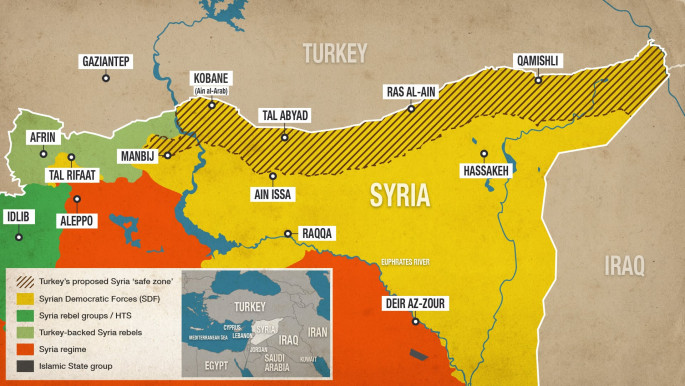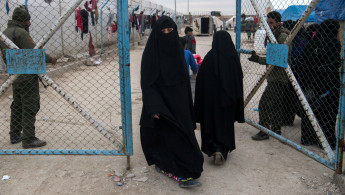Syrian Kurdish forces say they can't secure IS prisons for much longer amid continued fighting
Fighting between Kurdish forces and Turkey-backed militants continues despite a Russia-brokered ceasefire.
3 min read
Thousands of suspected IS members are in Kurdish captivity [Getty]
Syrian Kurdish forces have repeated warnings that they are unable to secure prisons holding suspected Islamic State group members for much longer as fighting with Turkey-backed forces continues.
The Kurdish-majority Syrian Democratic Forces (SDF) have long insisted that a much-anticipated Turkish offensive would render them unable to secure and defend camps and prisons holding suspected IS members.
Those fears came true earlier this month, when Turkey and allied Syrian militant groups launched an offensive to push back the Kurdish forces from the region bordering Turkey.
US officials say at least 100 IS fighters have been able to flee from captivity since Ankara began the assault.
The Syrian Kurdish forces claim another 800 IS family members fled from the Ain Issa camp.
This week Russia and Turkey signed a deal that will see Russian military police and Syrian border guards "facilitate the removal" of Kurdish People's Protection Units (YPG) from within 30 kilometres of the border.
But fighting between the Turkey-backed militants and Kurdish militias has continued despite the Russia-brokered ceasefire.
SDF commanders told The Independent on Friday that continued fighting has left the Kurdish forces unable to properly guard the prisons and camps.
"We are still maintaining control but if the Turkish threat and attacks continue, we do not know for how long we will be able to keep these prisons secured," Mervan Qamishli, an SDF commander and spokesman told The Independent. "We need help stopping the conflict so that our forces can return to protecting and managing the prisons."
Qamishli added that Kurdish forces are also concerned about the threat of IS sleeper cells, which he said had been strengthened by the Turkish incursion.
At least 12,000 IS fighters and tens of thousands of family members were being held by the Kurdish-led forces before the assault began.
The largest camp holding IS members is the Al-Hol camp close to the border with Iraq.
Some 70,000 people currently living in the camp, which was pushed past capacity earlier this year when the Kurdish-led SDF forced IS out of its last territorial stronghold in Syria.
Many of those living in the camp are unaffiliated civilians, but some 11,000 foreigners affiliated with IS also reside there.
There have been at least five attempts by IS-affiliated women to break out of the camp since the fighting began this month.
A leading camp administrator told The Independent that staff members had faced assassination threats from suspected women IS members.
Turkey's 'safe zone'
The plan to relocate vulnerable refugees to a war zone has been condemned by rights groups, who say the move would be a violation of the principle of non-refoulement and even an example of ethnic cleansing through demographic engineering.
Amnesty International on Friday accused Ankara of "forcibly" deporting Syrian refugees to the buffer zone region.
Amnesty says it obtained the testimonies of refugees who complained of being intimidated or physically forced by Turkish authorities to sign documents agreeing to a voluntary return.
Follow us on Twitter (@the_newarab) and Instagram (@thenewarab)
The Kurdish-majority Syrian Democratic Forces (SDF) have long insisted that a much-anticipated Turkish offensive would render them unable to secure and defend camps and prisons holding suspected IS members.
Those fears came true earlier this month, when Turkey and allied Syrian militant groups launched an offensive to push back the Kurdish forces from the region bordering Turkey.
US officials say at least 100 IS fighters have been able to flee from captivity since Ankara began the assault.
The Syrian Kurdish forces claim another 800 IS family members fled from the Ain Issa camp.
This week Russia and Turkey signed a deal that will see Russian military police and Syrian border guards "facilitate the removal" of Kurdish People's Protection Units (YPG) from within 30 kilometres of the border.
But fighting between the Turkey-backed militants and Kurdish militias has continued despite the Russia-brokered ceasefire.
SDF commanders told The Independent on Friday that continued fighting has left the Kurdish forces unable to properly guard the prisons and camps.
"We are still maintaining control but if the Turkish threat and attacks continue, we do not know for how long we will be able to keep these prisons secured," Mervan Qamishli, an SDF commander and spokesman told The Independent. "We need help stopping the conflict so that our forces can return to protecting and managing the prisons."
Qamishli added that Kurdish forces are also concerned about the threat of IS sleeper cells, which he said had been strengthened by the Turkish incursion.
At least 12,000 IS fighters and tens of thousands of family members were being held by the Kurdish-led forces before the assault began.
The largest camp holding IS members is the Al-Hol camp close to the border with Iraq.
Some 70,000 people currently living in the camp, which was pushed past capacity earlier this year when the Kurdish-led SDF forced IS out of its last territorial stronghold in Syria.
Many of those living in the camp are unaffiliated civilians, but some 11,000 foreigners affiliated with IS also reside there.
There have been at least five attempts by IS-affiliated women to break out of the camp since the fighting began this month.
A leading camp administrator told The Independent that staff members had faced assassination threats from suspected women IS members.
 |
Turkey's 'safe zone'
Turkey and its Syrian proxies launched a broad assault on Kurdish-controlled areas on 9 October after US troops pulled back from the border and started withdrawing from the northeast altogether.
Ankara had long planned the assault, which it insists is a necessary measure to secure its borders from the presence of the YPG, which Turkey considers a terrorist organisation.
Dozens of civilians - mostly on the Kurdish side - have been killed since the start of the offensive, and more than 300,000 people have been displaced, according to the Syrian Observatrory for Human Rights.
Turkish President Recep Tayyip Erdogan has claimed that between 1 and 3 million Syrian refugees currently living in Turkey will be moved to the so-called 'safe zone' in northeastern Syria.The plan to relocate vulnerable refugees to a war zone has been condemned by rights groups, who say the move would be a violation of the principle of non-refoulement and even an example of ethnic cleansing through demographic engineering.
Amnesty International on Friday accused Ankara of "forcibly" deporting Syrian refugees to the buffer zone region.
Amnesty says it obtained the testimonies of refugees who complained of being intimidated or physically forced by Turkish authorities to sign documents agreeing to a voluntary return.
Follow us on Twitter (@the_newarab) and Instagram (@thenewarab)





 Follow the Middle East's top stories in English at The New Arab on Google News
Follow the Middle East's top stories in English at The New Arab on Google News


